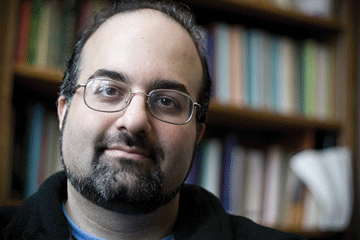
by Omid Safi, Sightings, January 27, 2011
One of the lower points in the Park51 Center controversy was the comment by New York Governor David Paterson: “This group who has put this mosque together, they are known as the Sufi Muslims. This is not like the Shiites…They’re almost like a hybrid, almost westernized. They are not really what I would classify in the sort of mainland Muslim practice.â€
In a few short sentences, the governor managed to offend Sufis, Shi’i Muslims, as well as westernized Muslims, non-westernized Muslims, and “mainland Muslims†(whoever they are). Paterson overlooked the fact that some Shi’i Muslims are mystically inclined, and that six million American citizens are Muslims, thus there is no question of “westernizing†or “almost westernizing†for them. There is a more disturbing implication hiding in his assertion: the ongoing way in which the general demonization of Muslims, of the kind now routine on Fox News, is accompanied by an equally pernicious game of Good Muslim, Bad Muslims.
There are many versions of this game, but the basic contour stays the same: The assertion that the general masses of Muslims are evil, terrorist-supporters, anti-western, patriarchal, misogynist, undemocratic, and anti-Semitic; and that these masses are set off and defined against either the solitary, lone Muslim good woman or man. The “Good Muslim†is often an individual, or a small circle, because to admit that the larger group of Muslims could be on the right side of the human-rights divide is to have the house of cards of the Muslim demonization game collapse on itself.
There are endless scenarios of this fictitious bifurcation: Reading Lolita In Tehran is “Good Muslim,†unspoken, nameless, faceless masses of Muslims are patriarchal, bad Muslims. Irshad Manji is an Israel-loving “good Muslim†who suggests that Muslims could be blamed for the holocaust, while the majority of Muslims are bad Muslims. Salman Rushdie and Orhan Pamuk are “good†secular or ex-Muslims, defined against the masses of Muslims. It is worth noting how easily and how frequently the “good Muslim†solitary figure ends up being prominently featured on the op-ed pages of the New York Times.
Sarah Palin famously addressed “Peace-seeking Muslims†on Twitter: “pls understand, Ground Zero mosque is UNNECESSARY provocation; it stabs hearts. Pls reject it in interest of healing.†In her inarticulate bifurcation, supporters of Park51 were defined as being outside the “peace-seeking†Muslim category.
The latest version of this bifurcation game of Good Muslim, Bad Muslims is that of pitting Muslim mystics (Sufis) as the “good Muslims†against the majority of Muslims cast as villains. Sufi tradition offers incredible reservoirs for mercy, love, and pluralism. Yet it is inaccurate, and politically appropriative, to present Sufism as disconnected from politics or wider social concerns at best, and as agents of the Empire at worst.
For the rest of this article at Sightings, click here.
Omid Safi is a Professor of Religious Studies at the University of North Carolina. He served as the Chair of the Study of Islam Section at the American Academy of Religion from 2002-2009. He is the author of Memories of Muhammad: Why the Prophet Matters (HarperOne, 2009).